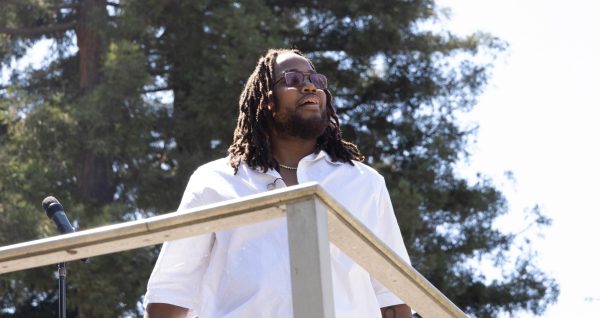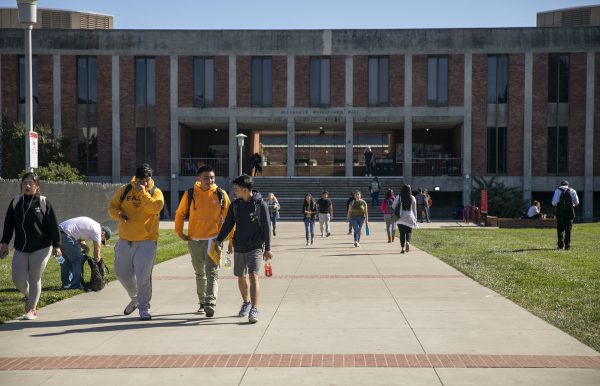Cal State East Bay’s announces vaccination requirements for staff, faculty, and students
August 25, 2021
After over a year of ‘Zoom university,’ East Bay is ready to have its students and faculty return to campus, with a vaccine mandate.
The school announced the vaccination requirement on July 27. “Anyone who plans to be at the Hayward, Concord, or Oakland Center campuses must be vaccinated or have a valid exemption,” East Bay’s President Cathy Sandeen wrote in an email to faculty, staff, and students.
Students with a valid religious or medical exemption are subject to weekly testing free of charge on the Hayward campus during the weeks of August 16 to August 23, Monday-Thursday 10 a.m. to 6 p.m. Beginning August 30, a testing site will be held in front of the University Student Health Center. Students need to bring either a state ID or Cal State East Bay ID.
East Bay will enact the requirement on Sept. 15 to allow time for students to become fully vaccinated or request an exemption. As of July 27, the school estimated about 80% of its students, staff, and faculty to be fully vaccinated.
Exemptions on the basis of medical and religious reasons are accepted, though many major religions do not prohibit vaccination. In fact, Pope Francis of the Catholic Church said “Morally everyone must take the [COVID-19] vaccine,” according to The National Catholic Reporter.
However, vaccine hesitancy is still high among students at the college. A survey conducted by The Pioneer, which polled about 800 students at the beginning of the year, found many students declined inoculation against COVID-19.
“It is unnecessary and is wrong. People should not be forced to get a 1 year old vaccine to go to school. Especially holding it over their heads that they cannot return on campus… Now adding this vaccine that has been proven faulty… not telling students to get a vaccine that will end all of our troubles,” one student, who wished to remain anonymous, responded when asked about their thoughts regarding the requirement.
Despite efforts to destabilize misinformation regarding the vaccine, many respondents still felt the vaccine was not effective nor safe for consumption. With a vaccination requirement, what happens to those who refuse to get inoculated? Many said they will continue their degree online.
“I would absolutely continue my degree online but what a disgusting decision. Vaccines protect the person that gets them, so if you are protected and covered great, don’t worry about me,” another student who wished to remain anonymous responded.
“Absolutely not, those that are vaccinated will be protected, the vaccines have proven to be effective, so those who chose not to take it should not be barred. Those who are worried can take the vaccine and will be protected,“ an additional student (opted to remain anonymous) responded.
Yet, vaccination requirements at school are not a new phenomenon. Dating back to the early 19th century, the U.S. the Supreme Court has upheld the state’s authority to make these decisions. And many K-12 public schools throughout the U.S. require proof of immunization before children may attend.
As of 2020, CSUEB requires vaccination against: Measles and Rubella, Hepatitis B, and strongly recommends vaccination for Meningococcal.
“I think that we have mandated vaccinations before and it was not a problem so I think we should make it a requirement for the safety of everyone,” East Bay student Sara Miranda wrote.
Concerns and comments wavered between students’ thoughts regarding the vaccine. An overwhelming majority of those polled cited concerns of the vaccine being “useless” and “experimental” in addition to it “causing infertility.”
However, the fact is: vaccines are safe, effective, and do not cause infertility. Unlike typical vaccine trials, the COVID-19 vaccine trials tested a sample size almost three times the usual amount, totaling to about 70,000 subjects, WCNC reported. With the recent uptick in COVID cases among the unvaccinated, the only way forward to curb the pandemic and return to a ‘new normal’ is through inoculation.
Some students were in agreement with the requirement.
“This requirement is necessary, college students are bound to get together and partake in activities that can spread the virus of [COVID-19]; some students, like me, are scared to go on campus and potentially become infected if students and staff are not vaccinated,” East Bay student Klara Gutierrez responded.
The increase of COVID-19 cases is a result of the virus mutating among the unvaccinated, which led California to become overwhelmed with the Delta variant. The Delta variant is the most deadly among all other variants and 99% of deaths have been among the unvaccinated, CDC Director Dr. Rochelle Walenksy said.
Recent reports have recorded young healthy patients begging for the vaccine just moments before intubation.
“I’m admitting young, healthy people to the hospital with very serious COVID infections,” Brytney Cobia, a doctor in Alabama, wrote in a Facebook post.
“One of the last things they do before they’re intubated is beg me for the vaccine. I hold their hand and tell them that I’m sorry, but it’s too late,” she added.
Back at home, in the Bay Area, there have been an additional 668 cases as of August 17, bringing the total number of infections to 503,457, according to SFist. Deaths are at 5,923. To combat this, everyone who is able to get the vaccine should.
Breakthrough infections are still occurring but numbers remain low and almost all deaths have been among the unvaccinated across the country.
Students who refuse inoculation or weekly testing will have to navigate other routes to complete their degrees. “There are many details for our university to work out in terms of implementation and confirmation of vaccination status. However, with approximately 50% of our course sections this fall offered via remote format, students have options to help them continue along their path to graduation,” Sadeen concluded in the email.
The facts are: vaccines are safe, effective, and the way to get out of the pandemic.
To find vaccine clinics near you click here.
Additionally, here is a COVID-19 vaccine fact sheet.
















